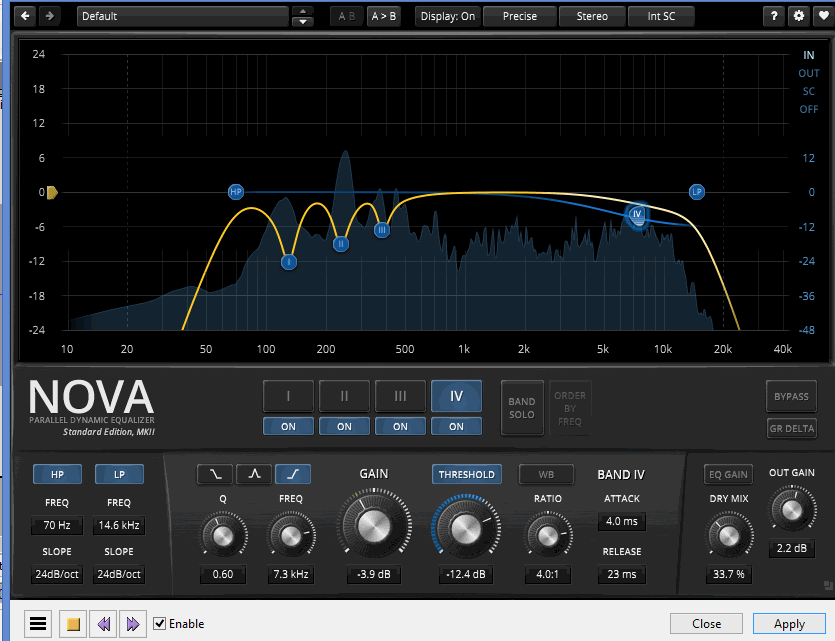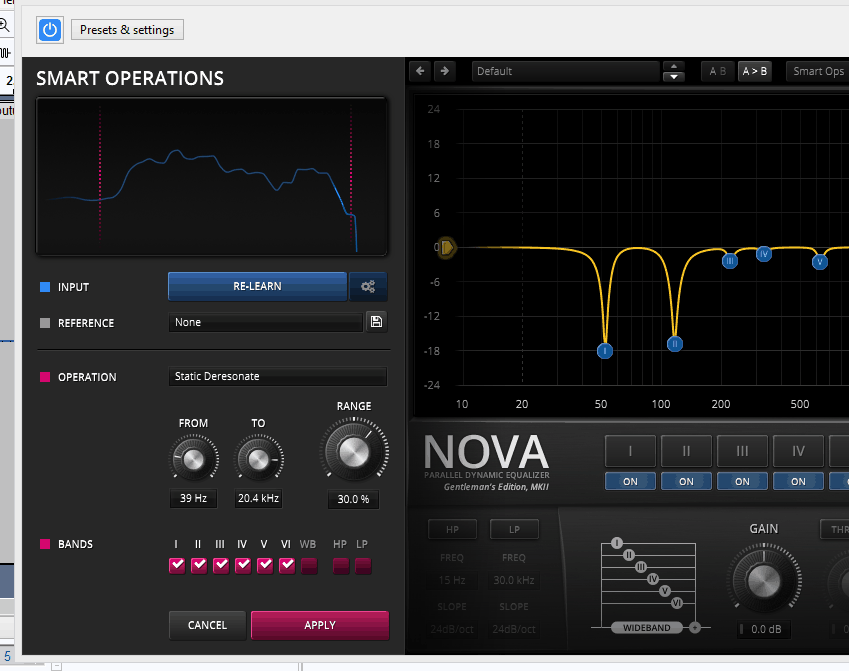Thank you, Trebor!
I’ve tried to deresonate the bass by-ear using the Free version of TDR Nova …

NOVA preset for Aud52556.xml (20.3 KB)
Quick note here. Nothing to the left of 100Hz is going to make it past Audiobook Mastering. That’s the 100Hz rumble filter preconditioning for Loudness and Limiter. So if the tool is using those tones to balance theatrical presentation, they may produce the wrong balance.
It’s not the best idea to put anything after Mastering because that may throw submission loudness and limiting off.
Instability in audiobook reading is to be avoided. There’s nothing quite as much fun as trying to correct one chapter in the middle of a book and still make it match all the others.
Koz
In this particular case 121Hz & 242Hz are the worst offenders, both will make it into the show
I’ve not tried the paid-for version of TDR Nova, but it can automatically de-resonate … https://youtu.be/GNqfyAa1jxk?t=71
(probably better than I can, as it has more bands to play with)
A day or two ago Koz suggested that I ask ACX if it’s possible for me to pay them to review my project before I’ve completed the entire 600-page book.
I called them up today to ask them that.
They said no, they don’t offer that service. But they said they do have something called Audio Lab where you can submit a file for review.
Here are the instructions for Audio Lab:
“Upload you finished files below and see how they measure up to ACX’s submission requirements for RMS, peak levels, bitrate, bitrate method, sample rate, mixed channels, duplicate files, and spacing. Only you see the results. Audio Lab does not detect issues such as noise floor or editing errors, so remember to conduct your own thorough review of your files before submitting finished audiobooks to ACX.”
So I submitted an 11-megabyte mp3 file of the chapter that I just recorded.
It took a minute or two for the system to process it, and then it said “No issues found.”
It then allowed me to download the following Report:
File Run Time (hh:mm:ss) RMS (dB) Peak (dB) Bit Rate (kbps) VBR Sampling Rate (kHz) Found Beginning/Ending Silence
Chapter 51 mp3.mp3 0:04:48.89 -22.4 -5.9 320 N 44.1 FALSE
I’ve now tried the GE version of TDR Nova, with smart ops, it agrees with me about the ~121Hz resonance …
But not the 242Hz, (maybe I’m smarter
they do have something called Audio Lab
Did you notice that Audio Lab checks exactly the same things that Audacity ACX-Check does, except ACX-Check also checks noise? Everything you can check without human intervention.
Unfortunately, you need human intervention to check echo, reverb, stuttering, slap, lisping, p-popping, tongue-ticking, epiglottal honking, comb distortion, theater, interpretation, and whether or not you’re in the right language.
It was my mouth noises that killed my career reading audiobooks. I have nuclear-rated tongue ticks. Fortunately, I had Human Quality Control for voice tests right at the beginning and he flagged my voice damage.
You have amazingly bad timing. With the Covid Pandemic distortions, everybody on earth decided to read audiobooks from home. ACX discovered they could relax their quality control and still turn out terrific products. So they did. They can still do full quality control before publishing, but now, they have a lot more "Nope. Sorry. Next in Line."
Koz
Thanks, Koz.
I’m curious about something.
You mentioned that your mouth noises killed your career reading audiobooks.
What career did you get into after that?
Also, what inspired you to start offering your wonderful help on this forum?
Radio, Television, Electronics, Broadcast, Video/Audio for the movies.
I know what those towers on the top of the mountain do…it detail. That tower way over on the left there? That used to be KCBS-2 until they moved.

That was pushing it. There was never any danger of me becoming a famous audiobook reader. I wanted to see how far I could get before they caught me.
I think I’m still one of the elves on the Final Cut Pro video editing forum. We had Final Cut at the company and I had hands-on to solve user problems. “It’s a super duper bad idea to try and edit your video on USB drives”.
Fading over to Audacity was a natural. And then I retired.
Koz
Thanks. Good to know.
Hi Koz,
I haven’t been in touch for a couple years. I’m still working on this audiobook! I think I’ll finally be finished by this summer. (As I think you mentioned originally, newbies like me typically finish the audiobook and then realize that the earlier parts of the book sound awful, and then have to start all over again. Well, I’m retired, so it didn’t bother me. Gives me something interesting to do in my retirement.)
I had to make some changes in my mastering recently due to several reasons including getting a new computer and I think some changes made in recent versions of audacity.
It used to be that when I did the mastering, it would increase the audio volume, but then all of a sudden it stopped doing that.
So then I played around with the mastering, and finally got it to increase the volume like it used to.
Here are current mastering steps:
Filter Curve EQ
Legacy Compressor
Normalize
Loudness Normalization
Legacy Limiter
ACX check
It may seem strange that I use both Normalize and Loudness Normalization, but if I skip the Normalize step, then the audio volume does not increase the way it used to. The good news is: The chapters I’m recording now sound just about the same as the ones I recorded prior to getting the new computer.
My question is: Is it OK to do both of those steps: Normalize and Loudness Normalization?
Thanks.
No harm in doing that, but the normalize step prior to Loudness Normalization is redundant.
If you omit the normalize step the outcome should be the same.
When I omit the normalize step, the ACX check fails:
Peak level: -9.14 dB too low -may be overly compressed or too quiet.
RMS level -26.31 Fail too quiet.
Audacity’s Normalize has an optional “Remove DC offset”, if that has been enabled it could make a difference to subsequent threshold-dependent effects , if there was DC offset to be removed from the waveform.
